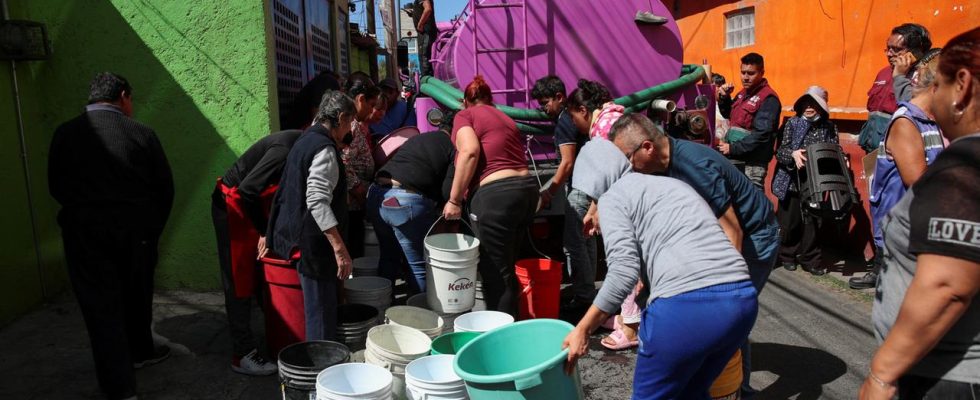For millions of Mexico City residents, going to the toilet is becoming an increasingly common problem. The metropolis suffers from a chronic lack of water. A company wants to counteract this with the “toilet of the future”.
The sound of a toilet flushing can no longer be heard in Dora’s house. “El baño del futuro” – “Toilet of the Future” is written on a framed piece of fabric embroidered in blue cursive next to the toilet door. The family of six has had a dry toilet for five years.
“My family asked me, ‘Why are we the only crazy people who have this?'” Dora remembers. “I said, ‘I know it might be weird at first, but eventually you’ll agree with me.'”
Just a few months later, there was no water in her block for five weeks and she and her family had a clear advantage. Dry toilets require no flushing water, no chemicals and, if treated appropriately, they also produce good fertilizer.
“This gives us the opportunity to try something different and save drinking water at the same time,” explains Dora. “And the wastewater does not enter the Tula River, where all the dirty water from the drains of 20 million people and the region’s enterprises ends up.”
Dry toilets also important for schools
The dry toilets can be quickly installed in every apartment and house. From a purely external point of view, they hardly differ from a normal toilet. Only the inner casing is a bucket. After every time you go to the toilet, you pour sawdust instead of water. Jeinny Solis designed the dry toilets and is trying to bring them to city dwellers through her company WCEco.
“We have now installed 1,000 dry toilets, 90 percent of them in urban centers – in Guadalajara, Monterrey, Mexico City, Oaxaca,” she lists. “In hotels, restaurants, in training centers – and in schools”. This is a very important point. “Because if there is no water in the schools, that means the toilets don’t work, the schools have to close. That is of course also a problem for the parents.” With the dry toilets, classes no longer have to be canceled.
Experts warn that the water shortage is getting worse
Mexico City suffers from chronic water shortages. Time and again, individual parts of the city are left high and dry in the truest sense of the word. “The groundwater storage here in the region has been overused for more than 60 years,” says Solis. “But now it’s the case that the storage is hardly being filled anymore.”
At the beginning of the year, Mexico City’s Conagua water company stated that there were currently only just under 40 percent reserves left in the dry season. The last time there was water in Dora’s neighborhood was in February for three weeks.
Experts warn that water will become even more scarce in a few months. According to authorities, last year was already the driest in Mexico’s history. Nevertheless: The coordinator of the water network at the Mexican university UNAM, Fernando González Villareal, is confident that good stewardship will not lead us to day zero: “However, we have to deal with it very consciously, that applies to all Mexicans. We have to use the water like “We have to look after a treasure. And we have to spend money to repair leaks in the pipes.”
Toilet contents as fertilizer for reforestation
And the dry toilets help with the more conscious use of water, so everyone can make their contribution, says Solis. When four buckets are full, she and her colleagues pick up the containers and bring new empty ones along with a load of wood chips. That’s part of the service.
“Today we are the only company in Latin America that offers the complete package of services: the design and manufacture of the dry toilet, the sale or rental for major events, the collection of the full buckets, the composting of the collected material,” says Solis proudly.
The resulting nutrient-rich soil, the fertilizer, can then be used to reforest areas – or even for your own garden. Solis’ company is gradually reforesting trees on eight hectares, because they also ensure that the water cycle is kept going.
“There will always be shit”
Dora’s family is estimated to only use a quarter of the amount of water they did in the past. In addition to the dry toilet, they installed a rain collection system that cleans water using a filter.
The dry toilets are just the beginning, says Jeinny Solis. Everyone should ask themselves how they can change something. “I always say – there will always be shit. So we have to realize that our behavior in everyday life has an influence and this influence is very big and makes a difference.”
Anne Demmer, ARD Mexico City, tagesschau, March 22, 2024 9:35 a.m

